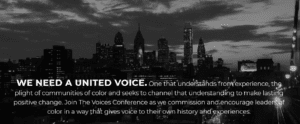
Tokunbo A. Adelekan, Ph.D., is Associate Professor of Theology & Ethics at Palmer Theological Seminary of Eastern University and Senior Pastor of The Tabernacle Baptist Church of Dayton, Ohio. His forthcoming book is called Trumpet of Compassion: An Essay on the Role of Biblical Compassion in Social Reconstruction. We reached out to him to get his thoughts on what racial justice and healing might look like in 2022 America.
Why was the murder of George Floyd a pivotal moment for us as a nation, and for the church as a whole?
The night of May 25, 2020, changed how America sees itself. George Floyd, a 46-year-old African-American man, was ignominiously murdered when a white law enforcement officer suffocated him by placing his knee on his prone body for what became popularly tagged as (8:46)—8 minutes, 46 seconds.
The recording of the incident, from the phone of a digital activist, went viral that night, sparking a wave of protests from Dayton to Dublin, Philadelphia to Paris, Los Angeles to London, and the sort of social upheaval we have not seen since the assassination of Dr Martin Luther King, Jr.
While Floyd’s death was certainly the catalyst (heightened by the fact that it occurred during a pandemic in which the victims were disproportionately people of color), it also served to lubricate a global campaign that was indicative of a multicultural, multiethnic, and multifaith Beloved Community—the kind of “World House” for which King lived, fought, and died so valiantly.
What sins/wounds did it expose?
The murder of George Floyd, Breonna Taylor, and others exposed not only the ugly sin of racism, but also the ways in which police indifference, a recalcitrant system of law enforcement, the anxiety of the majority culture, and, perhaps most insidiously, a church-sanctioned cultural conservatism have conspired to protect and promote the development of a culture of incivility and indecency where the lives of colored American lives are routinely decentered and degraded.
Moreover, the COVID-19 era of the mass social protests and system disintegration exposed White people’s enslavement to racism. The regime of death wrought by the pandemic unveiled mainstream culture’s tendency to despair and panic when conventional protections and privileges prove shaky and porous.
The specter of the pandemic brought into relief the hollowness of the White American dream and its sheer impotency against the tsunami of tragedy, trauma, and even trickery. Unprecedented waves of illness, overwhelmed social systems, random criminal attacks, depression, trauma, addictions, grief, exponentially increasing suicide rates, widespread criminal political bullying, and divisive religious demagoguery fed a pervasive sense of dread.
William Butler Yeats’ proleptic words conveyed in the iconic poem “The Second Coming” bear witness to our current hand-wringing: “Things fall apart; the centre cannot hold; Mere anarchy is loosed upon the world, The blood-dimmed tide is loosed, and everywhere the ceremony of innocence is drowned; The best lack all conviction, while the worst are filled with passionate intensity.” To fan the flames of hatred—in the face of such phenomena, the tissue-thin veneer of civilization feels flimsy indeed.
In your forthcoming book, Trumpet of Compassion: An Essay on the Role of Biblical Compassion in Social Reconstruction, you call us back to a biblical understanding of compassion. What are the key axis points for that, and who in the Scriptures exemplifies that for you?
Although not always unswervingly, from antiquity until today, God expresses compassion—a mode of Divine self-giving, of God’s unwavering love and unmistakable sacrifice for us. As settings changed, compassion endured, laying in place an ongoing mosaic of justice, peace, and righteousness for an uncaring world.
To be compassionate, one must see, hear, feel, act honorably, innovate, and improvise. Compassion is deeper than empathy in the sense that it requires the formation of a tension, a psychic stickiness that forges the acceptance of a kind of creative death. This is the process of becoming, of being discipled into the work of rescue, healing, and redemption.
In short, compassion involves a trialectical probing between God, the compassionate agent, and the recipient, thus forging the dance of deliverance whose most mature expression foreshadows the Kingdom of Heaven.
A shortlist of the towering exemplars of biblical compassion for me would include Joseph, Moses, Ruth, Deborah, Mary, Jesus, the Holy Spirit, the Apostle Paul, and the church in Philippi.
Why is compassion sometimes so hard for us today?
Widening class disparity, systemic gender oppression, increased racial animus, intense ideological divisions, and religious fear-mongering are a few of the factors that contribute to our current social malaise. However, the twin beasts of collective egoism and individual hedonism are the most enduring threats against compassion in our present moment. Both of these nefarious impulses exalt vulgar quests for power, privilege, visibility, and status over individuality and integrity, sacrifice and service, and care and covenant. They turn psychic energy and emotional energy inward, thus denying the heroic powers and sober outlooks needed to understand and uphold the humanity of others.
Financial markets too often determine the moral appetites and civic tastes—threatening the bonds of authentic community and foreclosing on social action. Hence, the creative, constructive, and courageous cupboards needed to overcome indifference and exclusions, blindness, and bullying are relatively empty and threadbare.
And the consequence of these elitist decisions made by a relatively small group of persons are disproportionately borne by the many—thus compounding social anxiety and limiting compassion.
In one of Jesus’ most widely taught parables, the Samaritan exercised compassion—he had the courage to address someone else’s hurt in the middle of danger and the competency to address the need. He had the resourcefulness and the resilience to overcome social barriers, and he had the warmth of concern to plan for a second visit.
You currently serve as senior pastor of Dayton’s (OH) Tabernacle Baptist Church, one of the fastest growing churches in Southern Ohio. There, you talk about fostering a “climate of spiritual adaptability and resilience.” What does this mean in light of all of the challenges we face today?
TBC’s re-missioning and re-prioritizing protocols have enhanced its corporate ability to reach a local, regional, and international audience with the gospel of Jesus Christ—amidst the aftershocks of COVID-19.
Inspired by the prophetic image of beating swords into plows, believers are committed to reimagining the world as one that turns from death to life, where swords become plows and guns are turned into garden tools. Unapologetically Spirit-led and Scripture-informed, the TBC of Dayton is pursuing innovative ways to respond to the tangled web of trauma, social frustration, economic toxic hyper-individualism, and cynicism that creates immense problems of communication and bond building.
The twin forces of police indifference and political blindness amidst a culture of retrenchment has made the need for courageous Christian response more pressing now, perhaps more than ever before. This process is guided by an egalitarian vision which embraces the needs, gifts, and competencies of the working class and under class groups that the congregation serves.
What are your hopes for the church in 2022?
In 2022, TBC is committed to the expansion of the Beloved Community in the region. TBC has developed the concept of “compassionate discipleship,” a missional-ethic that draws upon THE F.I.V.E.S. (Finance, Intercession, Vision, Evangelism, and Stewardship) and aids and abets a phalanx of disciples on the front lines of the battle against opioids, drugs, and racism.
Currently, we are coordinating an effort to establish pop-up COVID-19 test sites in an eight-county radius around the City of Dayton. We are a “village” where God is preparing a table, in the presence of the enemies of COVID-19 and the callousness of evil, that will host every tribe and every nation for his purpose. We are a church that remains in the process of “becoming.”
We have learned how to carry one of the Bible’s core commands―to seek righteousness―in a way that amounts to more than mere words and good intentions. In the process, we are embracing a new apologetic, where we create actionable, Jesus- centered conversations about deliverance, healing, forgiveness, and life transformation.
One thing is for sure: Without intentional planning, creative prioritization, agile and flexible decision-making, sacrificial leadership, and a whole lot of course-corrections along the way, we will not be able to achieve evangelistic fruitfulness.


